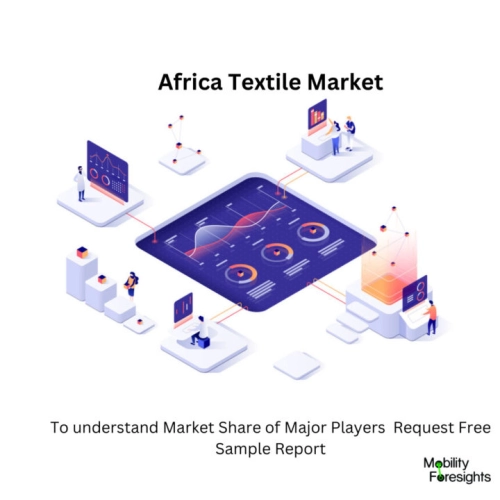
- Get in Touch with Us

Last Updated: Apr 26, 2025 | Study Period: 2023-2030
Africa has a very diverse textile sector, with different nations having specialisations in particular facets of textile manufacture. While some nations concentrate on the production of clothing, textiles, and fashion design, others engage in the growing and ginning of cotton.International recognition has been accorded to African fashion, and African designers are gaining prominence in the world of fashion.
Traditional patterns and materials are incorporated into African fashion, which supports the expansion of the textile industry.The African textile sector has potential, but it also faces a number of obstacles. These difficulties include inadequate infrastructure, restricted financial access, erratic power supplies, and competition from textile and apparel imports.
There are prospects for both domestic and foreign investment as the textile sector in Africa grows. To help this industry, investors might establish production facilities, investigate joint ventures, and make infrastructural and technological investments.

The Africa textile market accounted for $XX Billion in 2022 and is anticipated to reach $XX Billion by 2030, registering a CAGR of XX% from 2023 to 2030.
Faro is a "re-commerce" firm based in South Africa that aims to fight textile waste in Africa and increase access to high-quality apparel.In order to interrupt the inflow of problematic textiles by providing clients with a sustainable alternative, Faro collaborates with international fashion labels to source high-quality unsold apparel for resale in Africa.
They are committed to solving the current issue in addition to preventing waste, which is a fundamental aspect of the circular economy.Faro Impact will recycle an equal amount of textile waste for each kilogramme of premium, eco-friendly apparel we sell.
In order to directly deliver its unsold brand-new goods to the South African market, where it will be sold at up to 70% off retail pricing, Faro has teamed up with the Bestseller group, whose fashion brands include Jack & Jones, LMTD, Only, Vero Moda, Vila, and Noisy.
The firm is launching a fast retail roll-out after obtaining pre-seed funding. With the goal of reducing textile waste, they co-founded UCOOK and created Africa's largest B2B platform for clothes, drawing on their experience at Amazon.
| Sl no | Topic |
| 1 | Market Segmentation |
| 2 | Scope of the report |
| 3 | Abbreviations |
| 4 | Research Methodology |
| 5 | Executive Summary |
| 6 | Introduction |
| 7 | Insights from Industry stakeholders |
| 8 | Cost breakdown of Product by sub-components and average profit margin |
| 9 | Disruptive innovation in the Industry |
| 10 | Technology trends in the Industry |
| 11 | Consumer trends in the industry |
| 12 | Recent Production Milestones |
| 13 | Component Manufacturing in US, EU and China |
| 14 | COVID-19 impact on overall market |
| 15 | COVID-19 impact on Production of components |
| 16 | COVID-19 impact on Point of sale |
| 17 | Market Segmentation, Dynamics and Forecast by Geography, 2023-2030 |
| 18 | Market Segmentation, Dynamics and Forecast by Product Type, 2023-2030 |
| 19 | Market Segmentation, Dynamics and Forecast by Application, 2023-2030 |
| 20 | Market Segmentation, Dynamics and Forecast by End use, 2023-2030 |
| 21 | Product installation rate by OEM, 2023 |
| 22 | Incline/Decline in Average B-2-B selling price in past 5 years |
| 23 | Competition from substitute products |
| 24 | Gross margin and average profitability of suppliers |
| 25 | New product development in past 12 months |
| 26 | M&A in past 12 months |
| 27 | Growth strategy of leading players |
| 28 | Market share of vendors, 2023 |
| 29 | Company Profiles |
| 30 | Unmet needs and opportunity for new suppliers |
| 31 | Conclusion |
| 32 | Appendix |